Two by Kozintsev and Trauberg
Novyy Vavilon / New Babylon (Grigori Kozintsev & Leonid Trauberg, 1929)
Kozintsev and Trauberg had been working together for 8 years by the time the two made New Babylon. After several years collaborating in experimental theater, they made their first foray into film making in 1924. Having worked with Dmitri Shostakovich in some of their theater productions, they turned to him for their first attempt at making a film with an integral (live) musical score (albeit without dialog). The film suffered from government interference even before its formal premiere.
After several years collaborating in experimental theater, they made their first foray into film making in 1924. Having worked with Dmitri Shostakovich in some of their theater productions, they turned to him for their first attempt at making a film with an integral (live) musical score (albeit without dialog). The film suffered from government interference even before its formal premiere. 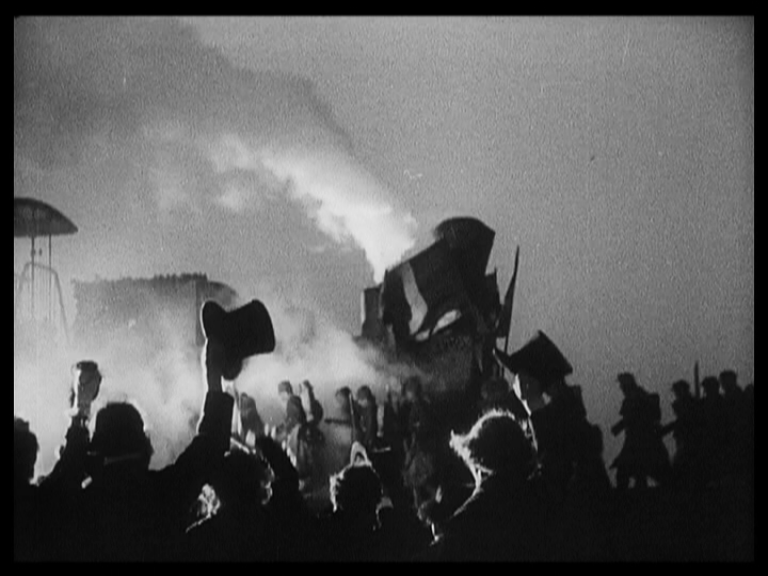 The government approved version was cut by 20 percent from its original length, and the synchronization of the music apparently no longer fully matched the creators' original intentions. These synchronization problems, together with the inability of the theater's orchestra to cope with Shostakovich's musical demands, helped ensure a less than rapturous initial reception.
The government approved version was cut by 20 percent from its original length, and the synchronization of the music apparently no longer fully matched the creators' original intentions. These synchronization problems, together with the inability of the theater's orchestra to cope with Shostakovich's musical demands, helped ensure a less than rapturous initial reception. 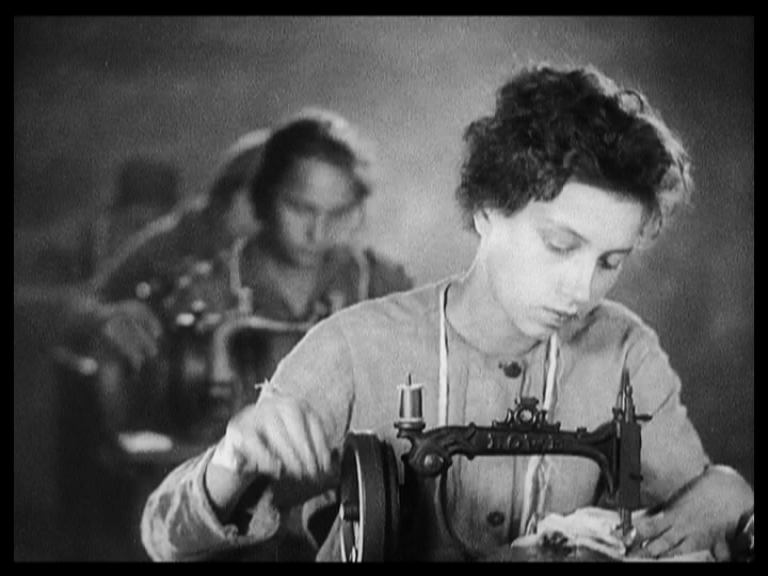 While the longer version has been reconstructed recently and re-synchronized with its original score (by British musicologist Marek Pytel) -- and performed at least once, it was not utilized for the Absolut Media (German) DVD. The cut version represented in this release was approved by one of its directors (Trauberg),
While the longer version has been reconstructed recently and re-synchronized with its original score (by British musicologist Marek Pytel) -- and performed at least once, it was not utilized for the Absolut Media (German) DVD. The cut version represented in this release was approved by one of its directors (Trauberg), 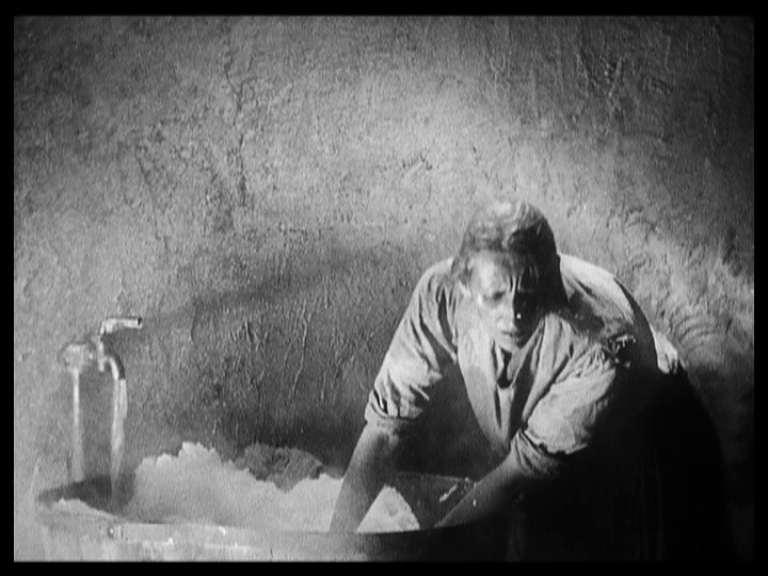 but only after the deaths of his two collaborators (Kozintsev and Shostakovich). At least for now, the current DVD represents the only reasonably available version of the film. (Note: an old Facets video might have represented a longer version, but it looked awful and had an inappropriate non-Shostakovich score).
but only after the deaths of his two collaborators (Kozintsev and Shostakovich). At least for now, the current DVD represents the only reasonably available version of the film. (Note: an old Facets video might have represented a longer version, but it looked awful and had an inappropriate non-Shostakovich score).
Even in possibly compromised form, what we find is an impressive film.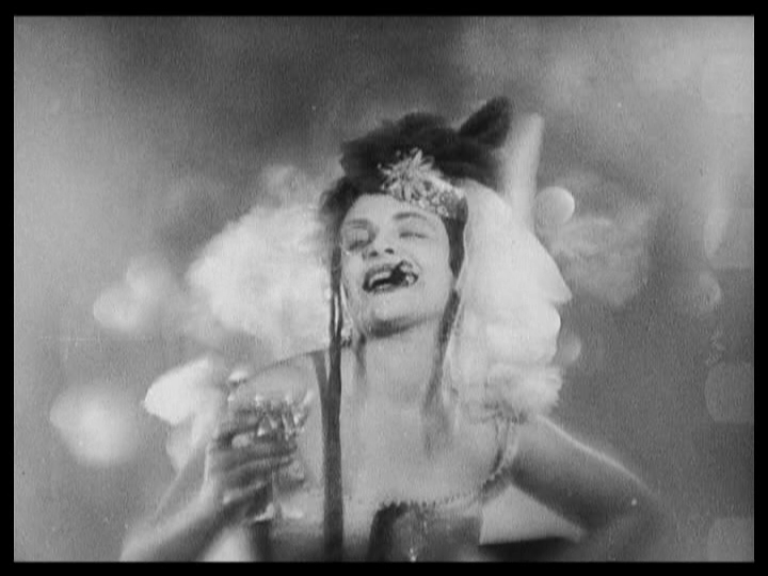 Its topic -- the rise and fall of the Paris Commune in 1871 -- seems like one that would get an epic treatment. However, like Kuleshov and Barnet (and unlike Eisenstein), Kozintsev and Trauberg focus on individuals not proletarian masses -- and incorporate a considerable amount of humor into their film (at least in its early phase).
Its topic -- the rise and fall of the Paris Commune in 1871 -- seems like one that would get an epic treatment. However, like Kuleshov and Barnet (and unlike Eisenstein), Kozintsev and Trauberg focus on individuals not proletarian masses -- and incorporate a considerable amount of humor into their film (at least in its early phase).
The story's focal character is Louise (played Yelena Kuzmina),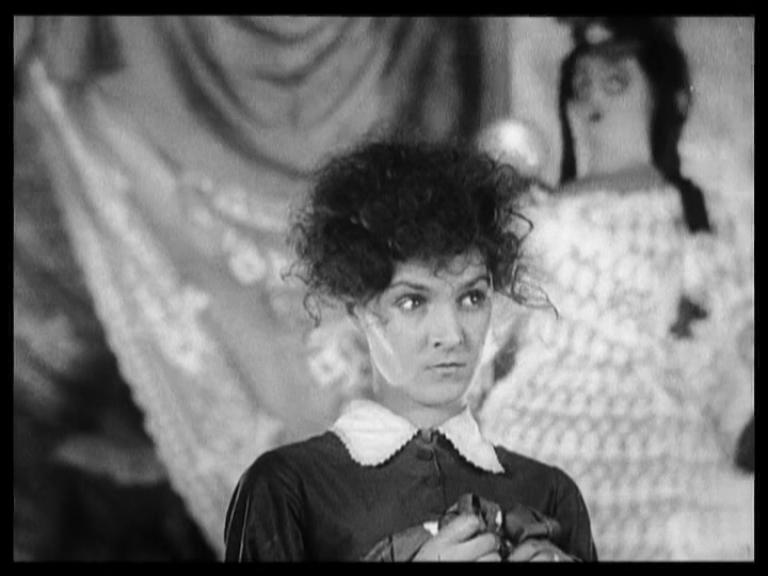 a shop girl in a shopping and entertainment complex in Paris called "The New Babylon" (which makes her an observer of the decadent Parisian upper class). Most of the characters in the film are ones with whom she comes in contact, at work and in her neighborhood. The secondary focus is on a low-ranking soldier named Jean (Pyotr Sobolevsky),
a shop girl in a shopping and entertainment complex in Paris called "The New Babylon" (which makes her an observer of the decadent Parisian upper class). Most of the characters in the film are ones with whom she comes in contact, at work and in her neighborhood. The secondary focus is on a low-ranking soldier named Jean (Pyotr Sobolevsky), 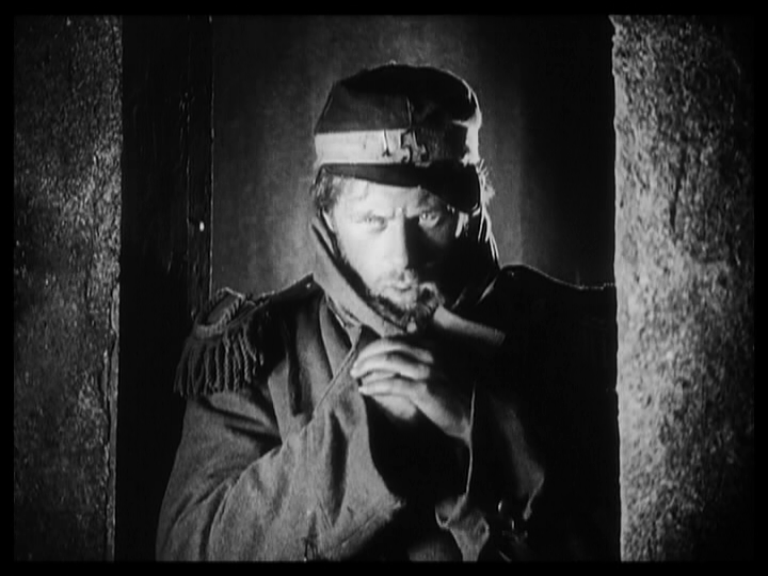 who is not a Parisian but rather comes from a rural village. During the siege of Paris by the Germans, Jean's military world intersects Louise's proletarian one. He is given food and money for ammunition (and has his shoes repaired) by the lower-class city dwellers. When the government capitulates to the Germans,
who is not a Parisian but rather comes from a rural village. During the siege of Paris by the Germans, Jean's military world intersects Louise's proletarian one. He is given food and money for ammunition (and has his shoes repaired) by the lower-class city dwellers. When the government capitulates to the Germans, 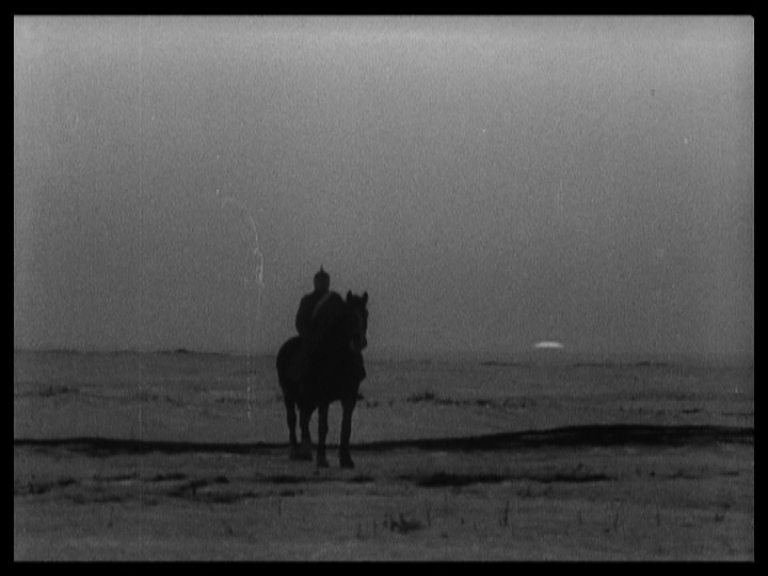 and the Parisian populace begins to express dissent, he casts his lot with the army and withdraws with them to Versailles. After the people of Paris take control over their own city (briefly), he plays his small part in crushing the "rebels" -- and then digging the graves of Louise and her comrades (the vengeful victors summarily executed tens of thousands of Parisians in the course of a couple of weeks).
and the Parisian populace begins to express dissent, he casts his lot with the army and withdraws with them to Versailles. After the people of Paris take control over their own city (briefly), he plays his small part in crushing the "rebels" -- and then digging the graves of Louise and her comrades (the vengeful victors summarily executed tens of thousands of Parisians in the course of a couple of weeks).
Visually the film is quite rich and heterogeneous,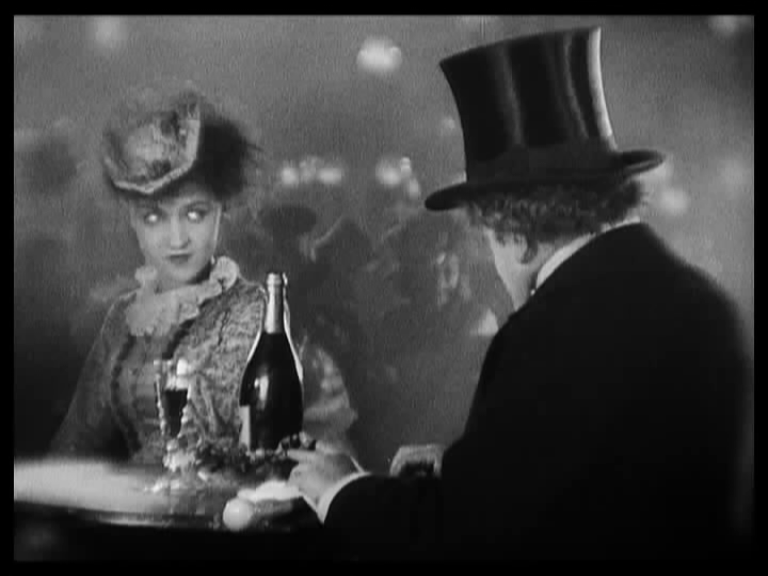 sometimes drawing almost as much on French impressionist (and post-impressionist) artwork as on contemporary cinematic norms. There are shots evoking Monet and Renoir and others inspired by Toulouse-Lautrec (who actually portrayed Parisian decadence of a somewhat later era). Other shots look back to the artwork of the French revolutionary period.
sometimes drawing almost as much on French impressionist (and post-impressionist) artwork as on contemporary cinematic norms. There are shots evoking Monet and Renoir and others inspired by Toulouse-Lautrec (who actually portrayed Parisian decadence of a somewhat later era). Other shots look back to the artwork of the French revolutionary period.
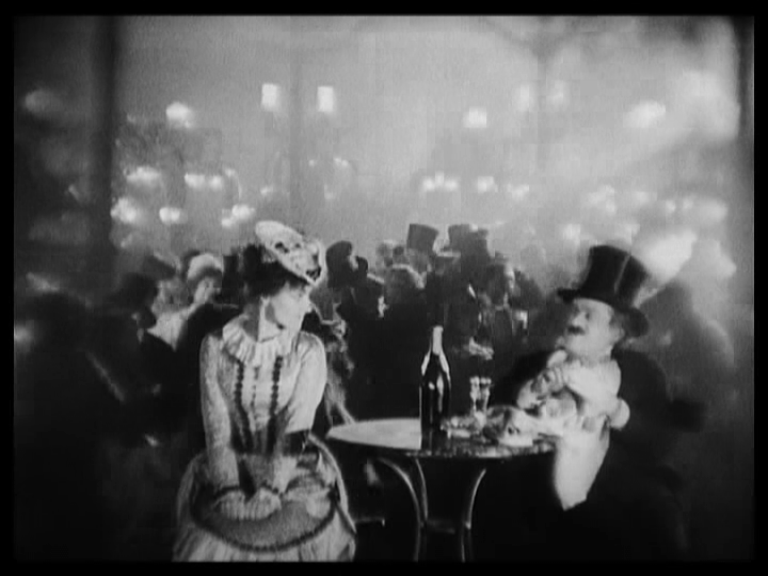 Kozintsev and Trauberg make some use of montage, but also present some quite extended scenes. Especially notable are two matched sequences, one from near the beginning and the other from near the end of the film. In the former, we see well-to-do Parisians dining in New Babylon's cafe, while behind them (and somewhat out of focus) we see others dancing manically.
Kozintsev and Trauberg make some use of montage, but also present some quite extended scenes. Especially notable are two matched sequences, one from near the beginning and the other from near the end of the film. In the former, we see well-to-do Parisians dining in New Babylon's cafe, while behind them (and somewhat out of focus) we see others dancing manically. 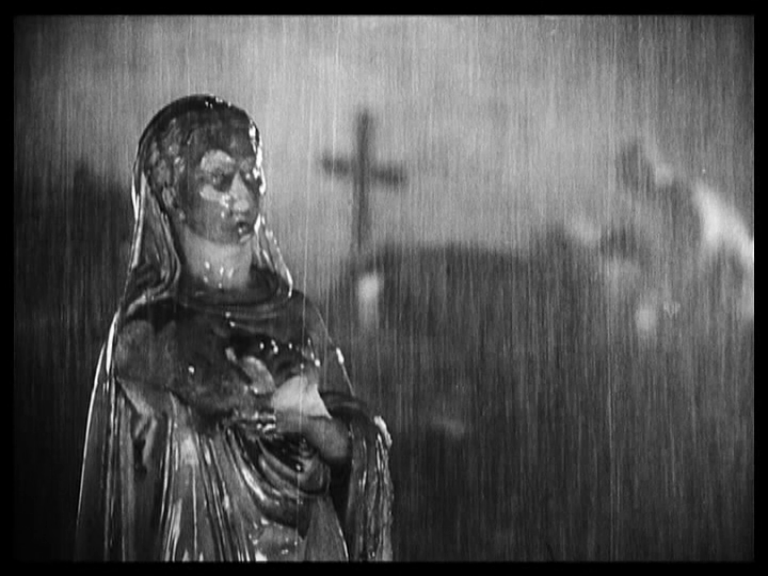 In the latter, we see Jean, shocked at what is happening, while behind him (somewhat out of focus) his comrades slowly and methodically dig the mass graves that will soon be filled. We also see a statuette of the Blessed Virgin overseeing the grim work, as the rainm pours down.
In the latter, we see Jean, shocked at what is happening, while behind him (somewhat out of focus) his comrades slowly and methodically dig the mass graves that will soon be filled. We also see a statuette of the Blessed Virgin overseeing the grim work, as the rainm pours down.
Young Kuzmina (only 20, in what seems to have been her first film role)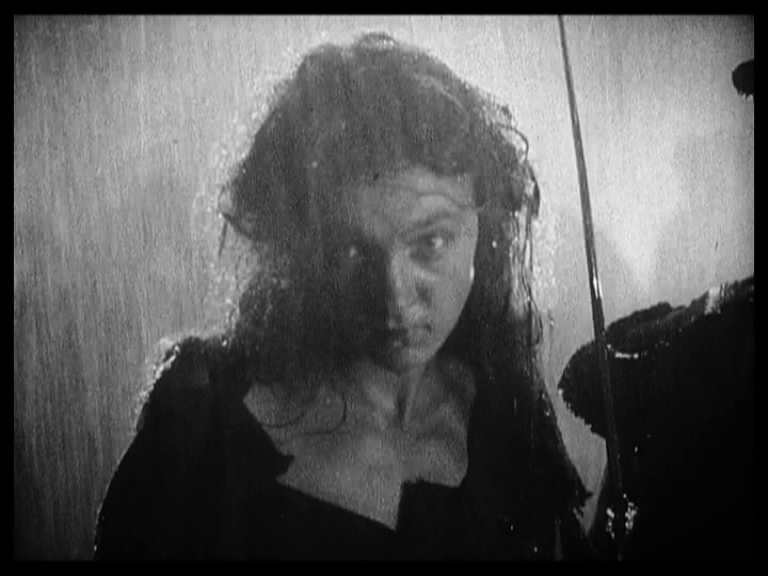 seems to have a keen sense of comedy, but is required to shift into melodramatic and then tragic heroic mode as the film moves towards its conclusion. Other characters are less individuated, but perform their roles effectively. Aside from Kuzmina, the other stars of the film are Andrei Moskvin's cinematography and Shostakovich's music.
seems to have a keen sense of comedy, but is required to shift into melodramatic and then tragic heroic mode as the film moves towards its conclusion. Other characters are less individuated, but perform their roles effectively. Aside from Kuzmina, the other stars of the film are Andrei Moskvin's cinematography and Shostakovich's music. 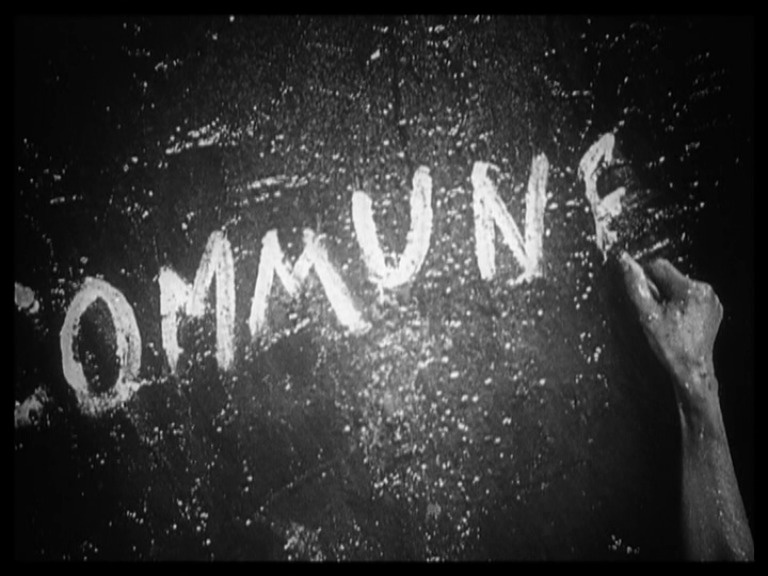 The images captured here are often remarkable, including ones not really susceptible to screen capture -- such as scenes played at night involving light reflected from the water laying on muddy roads and cobbled street, disturbed by moving shadows.
The images captured here are often remarkable, including ones not really susceptible to screen capture -- such as scenes played at night involving light reflected from the water laying on muddy roads and cobbled street, disturbed by moving shadows.
The plot can obviously be criticized as propagandistic (major script revisions were demanded after the film was initially approved, due to a shift in high level film making policy demand by Stalin). But I think one can say that the visual and musical-dramatic qualities of the film transcend whatever the purported propaganda was intended to be. Indeed, from the first, Shostakovich's score itself provoked outrage from political purists, as it did not support the noble message the film was supposed to present.
due to a shift in high level film making policy demand by Stalin). But I think one can say that the visual and musical-dramatic qualities of the film transcend whatever the purported propaganda was intended to be. Indeed, from the first, Shostakovich's score itself provoked outrage from political purists, as it did not support the noble message the film was supposed to present. 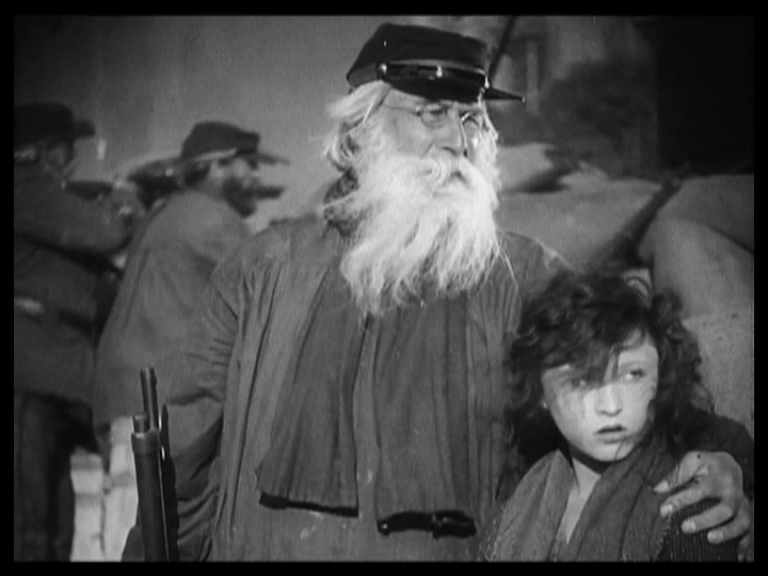 (Quoting from Offenbach's operettas during supposedly serious moments was an obvious sign of frivolity). Of course, Kozintsev and Trauberg affirmatively relied on Shostakovich to provide an additional level of "complication" to the film. Insofar as the film was shown after its controversial premiere performances, it was stripped of its score and accompanied by more suitable generic music.
(Quoting from Offenbach's operettas during supposedly serious moments was an obvious sign of frivolity). Of course, Kozintsev and Trauberg affirmatively relied on Shostakovich to provide an additional level of "complication" to the film. Insofar as the film was shown after its controversial premiere performances, it was stripped of its score and accompanied by more suitable generic music. 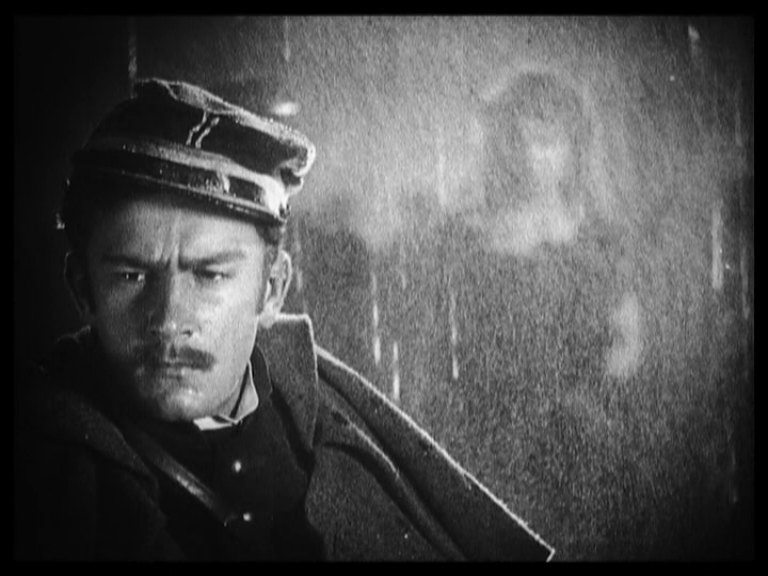 We are lucky that, at last, efforts are being made to allow audiences to see (and hear) some semblance of the film that the creators actually wished to make. Until such times as a DVD version of Pytel's fuller version (hopefully) arrives, the Absolut Media DVD (which is English friendly) is the best possible way for this film to reach the wider audience it deserves.
We are lucky that, at last, efforts are being made to allow audiences to see (and hear) some semblance of the film that the creators actually wished to make. Until such times as a DVD version of Pytel's fuller version (hopefully) arrives, the Absolut Media DVD (which is English friendly) is the best possible way for this film to reach the wider audience it deserves.
More screenshots:
http://i9.photobucket.com/albums/a59/mkerpan/kozintsev/vavilon/nb09.png
http://i9.photobucket.com/albums/a59/mkerpan/kozintsev/vavilon/nb12.png
http://i9.photobucket.com/albums/a59/mkerpan/kozintsev/vavilon/nb13.png
http://i9.photobucket.com/albums/a59/mkerpan/kozintsev/vavilon/nb14.png
http://i9.photobucket.com/albums/a59/mkerpan/kozintsev/vavilon/nb15.png
http://i9.photobucket.com/albums/a59/mkerpan/kozintsev/vavilon/nb16.png
http://i9.photobucket.com/albums/a59/mkerpan/kozintsev/vavilon/nb18.png
http://i9.photobucket.com/albums/a59/mkerpan/kozintsev/vavilon/nb20.png
Odna / Alone (Grigori Kozintsev & Leonid Trauberg, 1931)
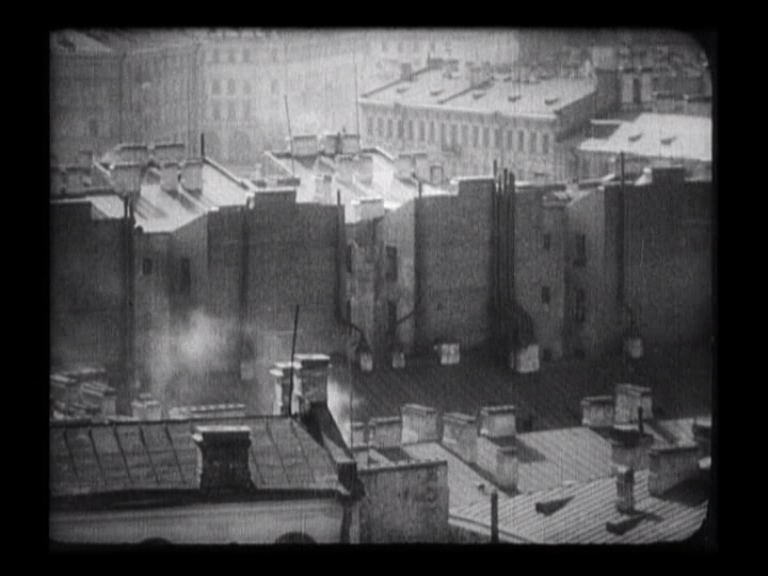 Kozintsev, Trauberg, Shostakovich, Moskvin, Kuzmina and others (including actor/assistant director Sergei Gerasimov and art director Yevgeni Yenej) must have appreciated working with each other.
Kozintsev, Trauberg, Shostakovich, Moskvin, Kuzmina and others (including actor/assistant director Sergei Gerasimov and art director Yevgeni Yenej) must have appreciated working with each other. 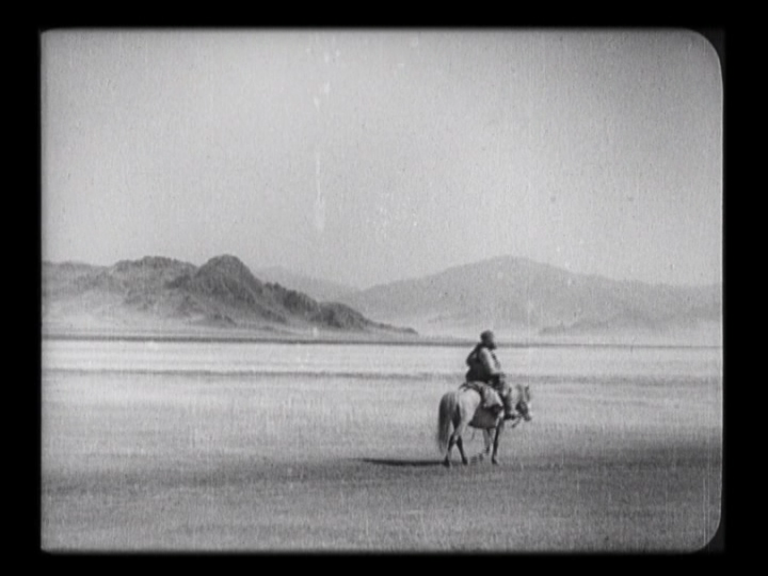 Despite all the problems connected with the making of New Babylon, they soon joined together to make another movie -- a sound film that was not quite a "talkie", set (mostly) in the vicinity of the Altai Mountains in Siberia.
Despite all the problems connected with the making of New Babylon, they soon joined together to make another movie -- a sound film that was not quite a "talkie", set (mostly) in the vicinity of the Altai Mountains in Siberia.
Once again, Kuzmina plays the central character -- a newly graduated teacher looking forward to a comfortable life in Leningrad (with her fiancee) who is, instead, assigned to a rural school in Siberia. Once there, she finds herself at odds with both the local party head
a newly graduated teacher looking forward to a comfortable life in Leningrad (with her fiancee) who is, instead, assigned to a rural school in Siberia. Once there, she finds herself at odds with both the local party head  and the still powerful traditional village leader. The lives of the children she is sent to teach are, like those of their parents, centered around the herding of sheep. When many of her students are co-opted for work with the sheep, she moves her classroom to the open air.
and the still powerful traditional village leader. The lives of the children she is sent to teach are, like those of their parents, centered around the herding of sheep. When many of her students are co-opted for work with the sheep, she moves her classroom to the open air. 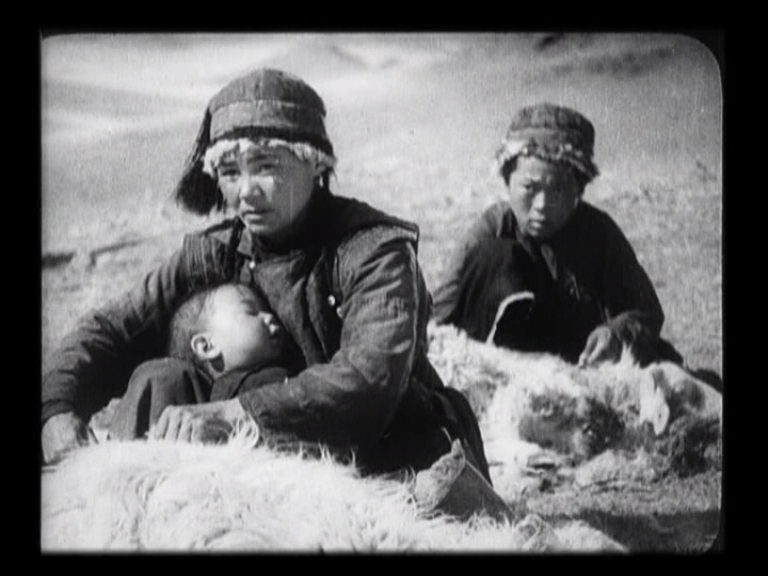 At first irritated by the universal preoccupation with sheep, she gradually comes to understand the importance of this activity. When the part boss (Sergei Gerasimov, a leftist journalist in New Babylon) and village leader (Liu-Sian Van, actually a local villager)
At first irritated by the universal preoccupation with sheep, she gradually comes to understand the importance of this activity. When the part boss (Sergei Gerasimov, a leftist journalist in New Babylon) and village leader (Liu-Sian Van, actually a local villager) 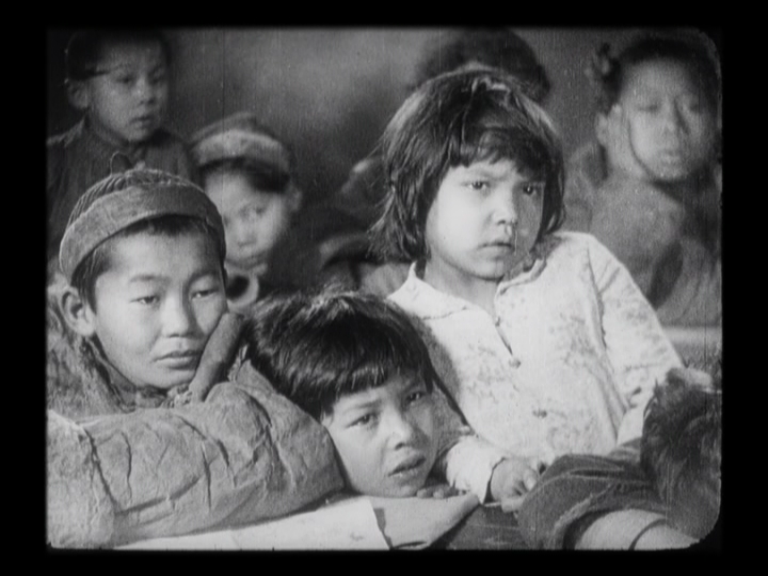 to sell the flocks off to a corrupt speculator (Pyotr Sobolevsky, the Jean of New Babylon), Kuzmina protests. When she attempts to travel to a neighboring village to speak to a higher level official, she is marooned in the middle of nowhere. Before she can return, she is caught in a sudden snow storm.
to sell the flocks off to a corrupt speculator (Pyotr Sobolevsky, the Jean of New Babylon), Kuzmina protests. When she attempts to travel to a neighboring village to speak to a higher level official, she is marooned in the middle of nowhere. Before she can return, she is caught in a sudden snow storm. 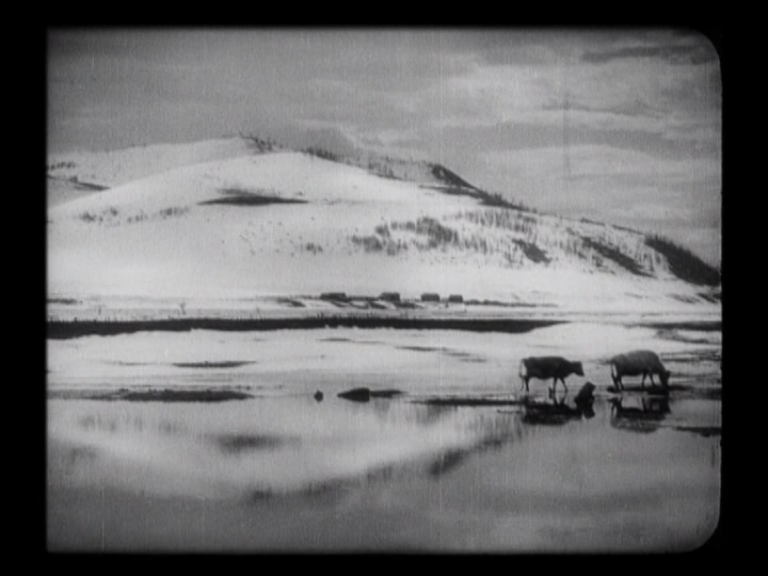 When villagers become concerned over Kuzmina's whereabouts, the party boss simply shrugs his shoulders. Nonetheless, volunteer searchers rescue her, though not before she has suffered from severe frost bite. On learning of the perfidy of their leaders,
When villagers become concerned over Kuzmina's whereabouts, the party boss simply shrugs his shoulders. Nonetheless, volunteer searchers rescue her, though not before she has suffered from severe frost bite. On learning of the perfidy of their leaders, 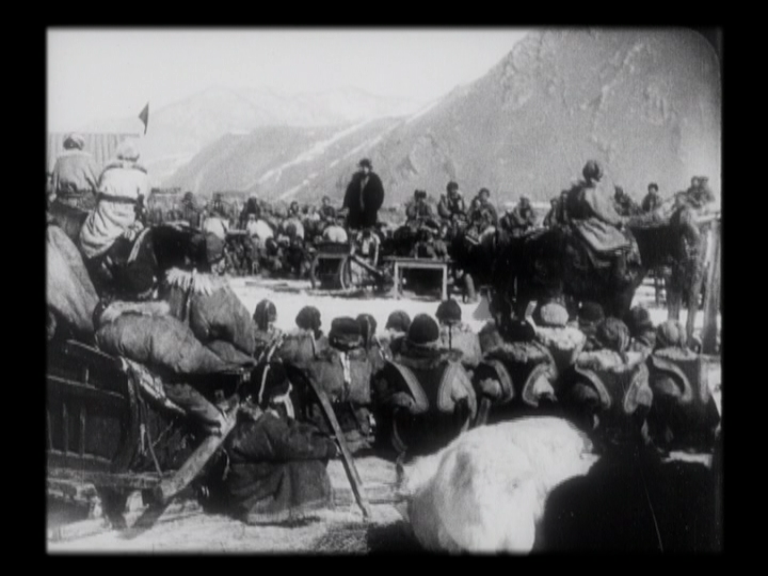 the villagers dislodge them, appointing new leaders -- who immediately request a medical rescue flight to take Kuzmina to the nearest (but still distant) hospital. As she is bundled into the airplane, she promises her students (and their parents) that she will return as soon as she can.
the villagers dislodge them, appointing new leaders -- who immediately request a medical rescue flight to take Kuzmina to the nearest (but still distant) hospital. As she is bundled into the airplane, she promises her students (and their parents) that she will return as soon as she can.
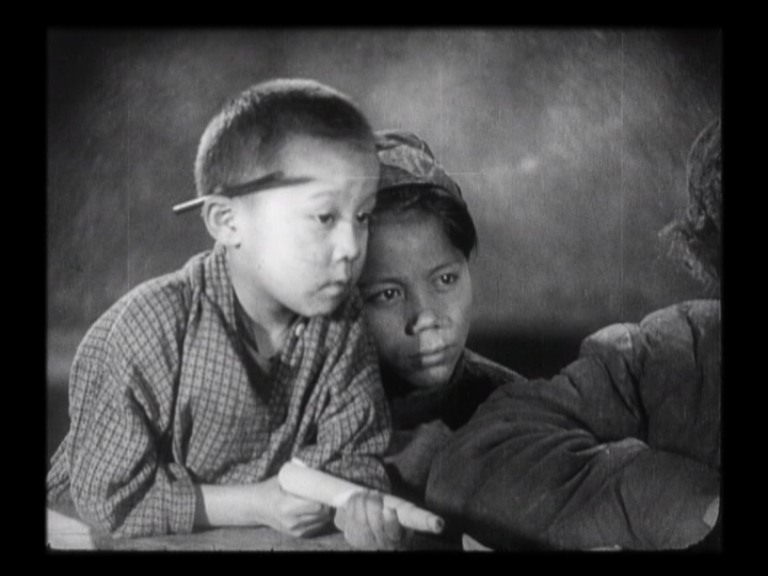 As with New Babylon, Kozintsev and Trauberg took on an approved topic (the promotion of rural education and adoption of collective farming principles) and proceeded to make a film that skirted the edge of what could be gotten away with.
As with New Babylon, Kozintsev and Trauberg took on an approved topic (the promotion of rural education and adoption of collective farming principles) and proceeded to make a film that skirted the edge of what could be gotten away with. 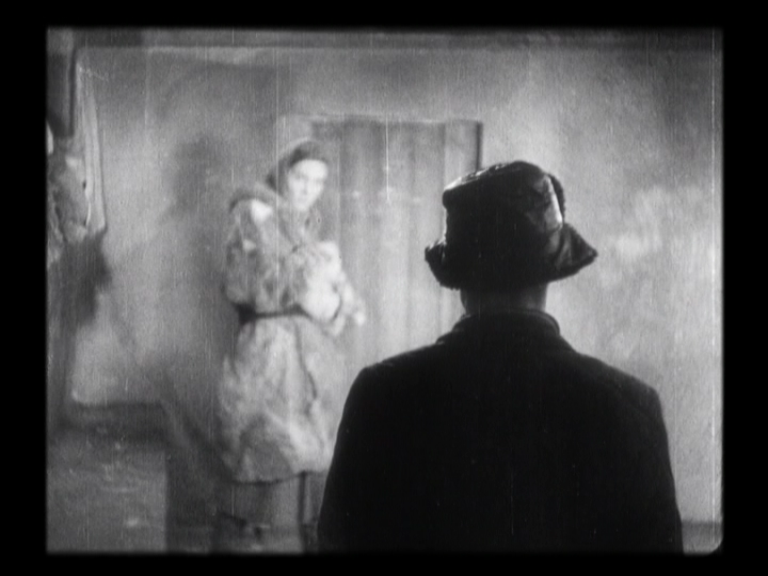 Again, significant script re-writing was mandated -- as the film was intended to be much darker in tone. Even so, one wonders how many other Soviet films of this era depicted a popular revolt against corrupt party leadership.
Again, significant script re-writing was mandated -- as the film was intended to be much darker in tone. Even so, one wonders how many other Soviet films of this era depicted a popular revolt against corrupt party leadership.
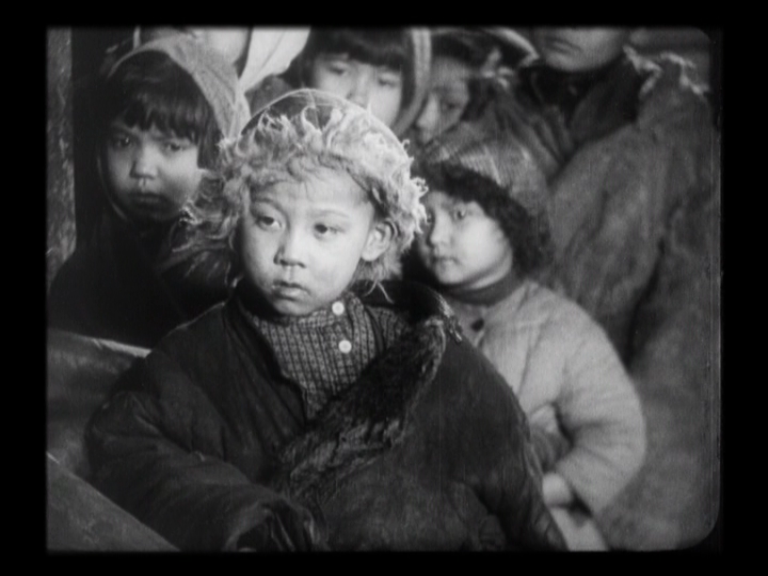 This is a much simpler film stylistically than its predecessor --and most of the storytelling is conveyed by the faces of its performers (almost all of whom were non-professionals, once the shooting moved to Siberia). The children in the film did a superb job,
This is a much simpler film stylistically than its predecessor --and most of the storytelling is conveyed by the faces of its performers (almost all of whom were non-professionals, once the shooting moved to Siberia). The children in the film did a superb job, 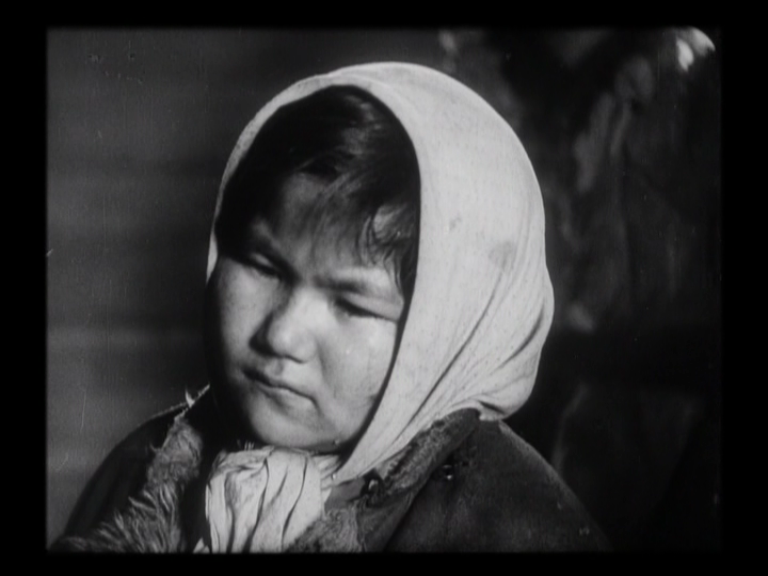 and the adults did almost as well. As in New Babylon, Kuzmina has to negotiate a role that starts off in full comic mode and then shifts from key to (usually darker) key. In one of my favorite moments, one of Kuzmina's most devoted students offers the gravely ill teacher her doll
and the adults did almost as well. As in New Babylon, Kuzmina has to negotiate a role that starts off in full comic mode and then shifts from key to (usually darker) key. In one of my favorite moments, one of Kuzmina's most devoted students offers the gravely ill teacher her doll 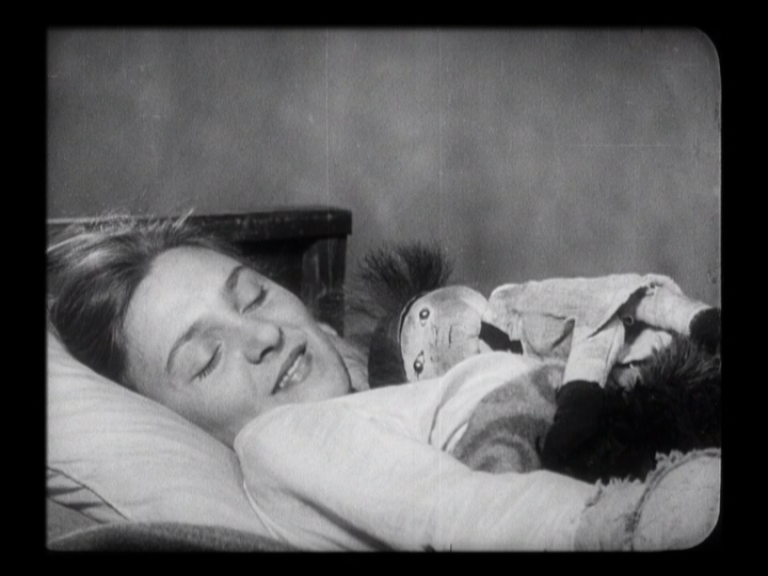 (presumably the only toy she owns) and Kuzmina manages to convey both her underlying pain and her happiness and gratitude for the girl's kindness. Gerasimov, on the other hand, is delightfully sleazy as the lazy and greedy party boss.
(presumably the only toy she owns) and Kuzmina manages to convey both her underlying pain and her happiness and gratitude for the girl's kindness. Gerasimov, on the other hand, is delightfully sleazy as the lazy and greedy party boss.
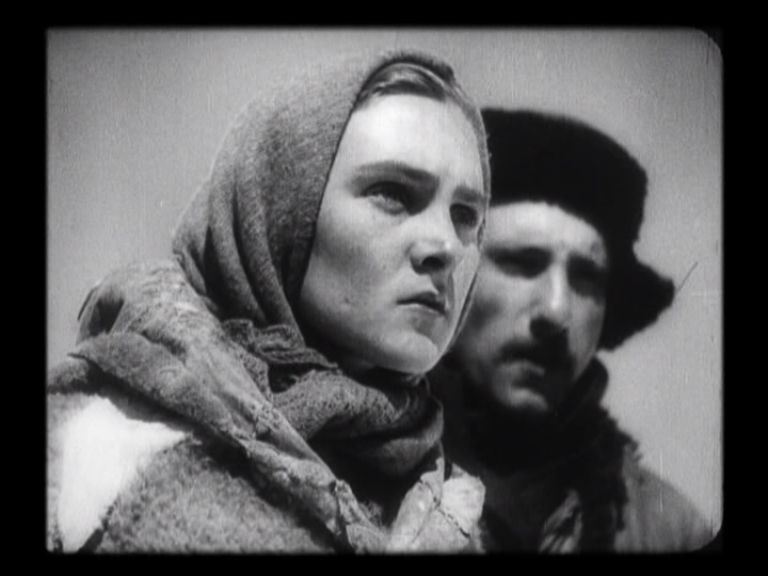 Shostakovich's music for this is also superb -- featuring the first use of a theremin in a film and Mongolian throat-singing. He designed the music in a more modular fashion overall, so as to cope better with imposed last-minute cuts.
Shostakovich's music for this is also superb -- featuring the first use of a theremin in a film and Mongolian throat-singing. He designed the music in a more modular fashion overall, so as to cope better with imposed last-minute cuts. 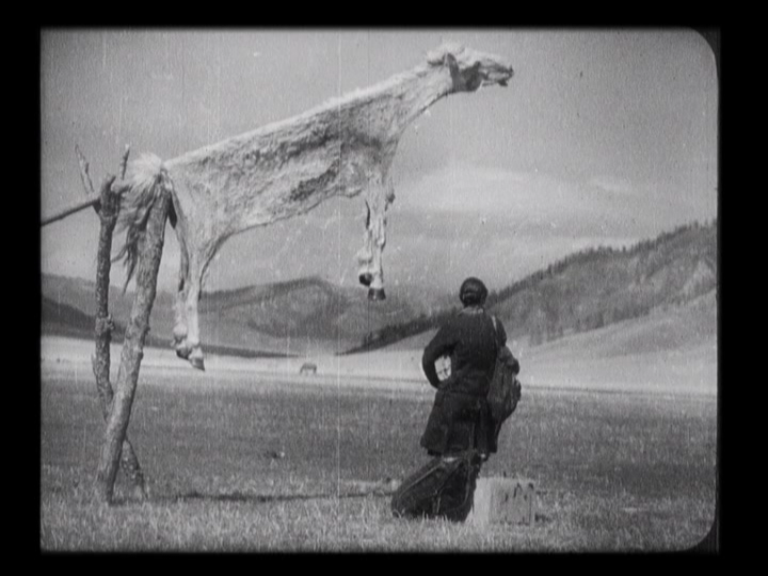 His music, plus information from the script, is all that remains from the reel of the film that remains lost. Unfortunately, the missing portion is actually the climax of the film -- when Kuzmina is abandoned in the face of an oncoming snow storm.
His music, plus information from the script, is all that remains from the reel of the film that remains lost. Unfortunately, the missing portion is actually the climax of the film -- when Kuzmina is abandoned in the face of an oncoming snow storm. 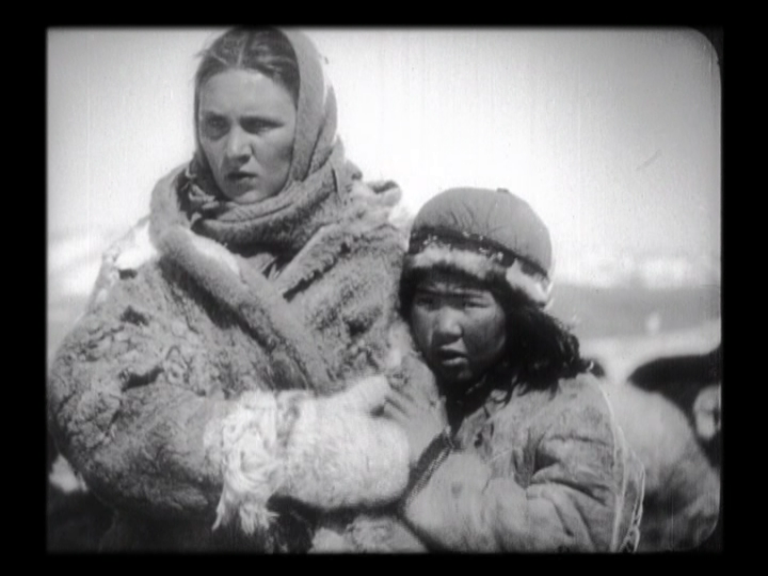 The Absolut Media DVD copes with the missing reel by adding descriptive titles that track the events as the (reconstructed) score plays. In addition to the music, Alone features sound effects and bits of talking here and there.
The Absolut Media DVD copes with the missing reel by adding descriptive titles that track the events as the (reconstructed) score plays. In addition to the music, Alone features sound effects and bits of talking here and there. 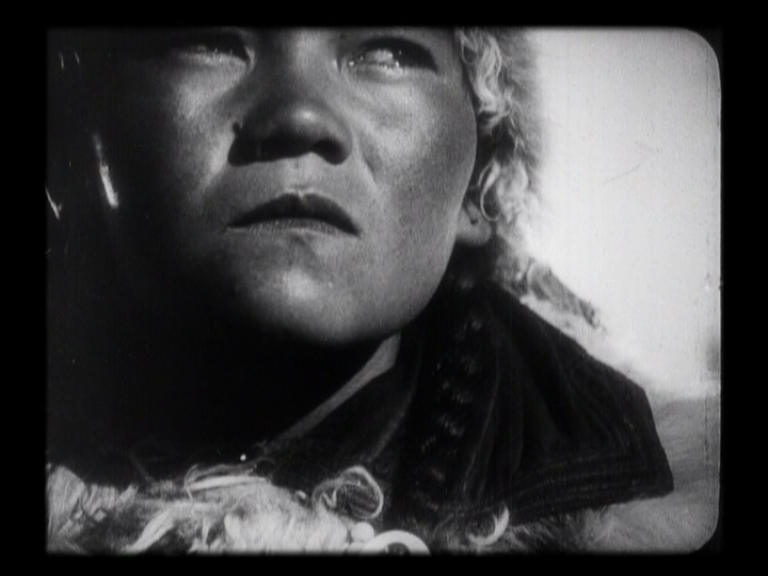 Most of the talking in the film emanates from public address speakers (and the like) -- but a couple of lines in the Leningrad section seem to be attributable to the actual characters. I would characterize this as another essential DVD for those who love early Soviet cinema.
Most of the talking in the film emanates from public address speakers (and the like) -- but a couple of lines in the Leningrad section seem to be attributable to the actual characters. I would characterize this as another essential DVD for those who love early Soviet cinema.
A few extra captures:
http://i9.photobucket.com/albums/a59/mkerpan/kozintsev/alone/odna03.png
http://i9.photobucket.com/albums/a59/mkerpan/kozintsev/alone/odna04.png
http://i9.photobucket.com/albums/a59/mkerpan/kozintsev/alone/odna05.png
http://i9.photobucket.com/albums/a59/mkerpan/kozintsev/alone/odna09.png
http://i9.photobucket.com/albums/a59/mkerpan/kozintsev/alone/odna12.png
Kozintsev and Trauberg had been working together for 8 years by the time the two made New Babylon.
 After several years collaborating in experimental theater, they made their first foray into film making in 1924. Having worked with Dmitri Shostakovich in some of their theater productions, they turned to him for their first attempt at making a film with an integral (live) musical score (albeit without dialog). The film suffered from government interference even before its formal premiere.
After several years collaborating in experimental theater, they made their first foray into film making in 1924. Having worked with Dmitri Shostakovich in some of their theater productions, they turned to him for their first attempt at making a film with an integral (live) musical score (albeit without dialog). The film suffered from government interference even before its formal premiere.  The government approved version was cut by 20 percent from its original length, and the synchronization of the music apparently no longer fully matched the creators' original intentions. These synchronization problems, together with the inability of the theater's orchestra to cope with Shostakovich's musical demands, helped ensure a less than rapturous initial reception.
The government approved version was cut by 20 percent from its original length, and the synchronization of the music apparently no longer fully matched the creators' original intentions. These synchronization problems, together with the inability of the theater's orchestra to cope with Shostakovich's musical demands, helped ensure a less than rapturous initial reception.  While the longer version has been reconstructed recently and re-synchronized with its original score (by British musicologist Marek Pytel) -- and performed at least once, it was not utilized for the Absolut Media (German) DVD. The cut version represented in this release was approved by one of its directors (Trauberg),
While the longer version has been reconstructed recently and re-synchronized with its original score (by British musicologist Marek Pytel) -- and performed at least once, it was not utilized for the Absolut Media (German) DVD. The cut version represented in this release was approved by one of its directors (Trauberg),  but only after the deaths of his two collaborators (Kozintsev and Shostakovich). At least for now, the current DVD represents the only reasonably available version of the film. (Note: an old Facets video might have represented a longer version, but it looked awful and had an inappropriate non-Shostakovich score).
but only after the deaths of his two collaborators (Kozintsev and Shostakovich). At least for now, the current DVD represents the only reasonably available version of the film. (Note: an old Facets video might have represented a longer version, but it looked awful and had an inappropriate non-Shostakovich score).Even in possibly compromised form, what we find is an impressive film.
 Its topic -- the rise and fall of the Paris Commune in 1871 -- seems like one that would get an epic treatment. However, like Kuleshov and Barnet (and unlike Eisenstein), Kozintsev and Trauberg focus on individuals not proletarian masses -- and incorporate a considerable amount of humor into their film (at least in its early phase).
Its topic -- the rise and fall of the Paris Commune in 1871 -- seems like one that would get an epic treatment. However, like Kuleshov and Barnet (and unlike Eisenstein), Kozintsev and Trauberg focus on individuals not proletarian masses -- and incorporate a considerable amount of humor into their film (at least in its early phase).The story's focal character is Louise (played Yelena Kuzmina),
 a shop girl in a shopping and entertainment complex in Paris called "The New Babylon" (which makes her an observer of the decadent Parisian upper class). Most of the characters in the film are ones with whom she comes in contact, at work and in her neighborhood. The secondary focus is on a low-ranking soldier named Jean (Pyotr Sobolevsky),
a shop girl in a shopping and entertainment complex in Paris called "The New Babylon" (which makes her an observer of the decadent Parisian upper class). Most of the characters in the film are ones with whom she comes in contact, at work and in her neighborhood. The secondary focus is on a low-ranking soldier named Jean (Pyotr Sobolevsky),  who is not a Parisian but rather comes from a rural village. During the siege of Paris by the Germans, Jean's military world intersects Louise's proletarian one. He is given food and money for ammunition (and has his shoes repaired) by the lower-class city dwellers. When the government capitulates to the Germans,
who is not a Parisian but rather comes from a rural village. During the siege of Paris by the Germans, Jean's military world intersects Louise's proletarian one. He is given food and money for ammunition (and has his shoes repaired) by the lower-class city dwellers. When the government capitulates to the Germans,  and the Parisian populace begins to express dissent, he casts his lot with the army and withdraws with them to Versailles. After the people of Paris take control over their own city (briefly), he plays his small part in crushing the "rebels" -- and then digging the graves of Louise and her comrades (the vengeful victors summarily executed tens of thousands of Parisians in the course of a couple of weeks).
and the Parisian populace begins to express dissent, he casts his lot with the army and withdraws with them to Versailles. After the people of Paris take control over their own city (briefly), he plays his small part in crushing the "rebels" -- and then digging the graves of Louise and her comrades (the vengeful victors summarily executed tens of thousands of Parisians in the course of a couple of weeks).Visually the film is quite rich and heterogeneous,
 sometimes drawing almost as much on French impressionist (and post-impressionist) artwork as on contemporary cinematic norms. There are shots evoking Monet and Renoir and others inspired by Toulouse-Lautrec (who actually portrayed Parisian decadence of a somewhat later era). Other shots look back to the artwork of the French revolutionary period.
sometimes drawing almost as much on French impressionist (and post-impressionist) artwork as on contemporary cinematic norms. There are shots evoking Monet and Renoir and others inspired by Toulouse-Lautrec (who actually portrayed Parisian decadence of a somewhat later era). Other shots look back to the artwork of the French revolutionary period. Kozintsev and Trauberg make some use of montage, but also present some quite extended scenes. Especially notable are two matched sequences, one from near the beginning and the other from near the end of the film. In the former, we see well-to-do Parisians dining in New Babylon's cafe, while behind them (and somewhat out of focus) we see others dancing manically.
Kozintsev and Trauberg make some use of montage, but also present some quite extended scenes. Especially notable are two matched sequences, one from near the beginning and the other from near the end of the film. In the former, we see well-to-do Parisians dining in New Babylon's cafe, while behind them (and somewhat out of focus) we see others dancing manically.  In the latter, we see Jean, shocked at what is happening, while behind him (somewhat out of focus) his comrades slowly and methodically dig the mass graves that will soon be filled. We also see a statuette of the Blessed Virgin overseeing the grim work, as the rainm pours down.
In the latter, we see Jean, shocked at what is happening, while behind him (somewhat out of focus) his comrades slowly and methodically dig the mass graves that will soon be filled. We also see a statuette of the Blessed Virgin overseeing the grim work, as the rainm pours down.Young Kuzmina (only 20, in what seems to have been her first film role)
 seems to have a keen sense of comedy, but is required to shift into melodramatic and then tragic heroic mode as the film moves towards its conclusion. Other characters are less individuated, but perform their roles effectively. Aside from Kuzmina, the other stars of the film are Andrei Moskvin's cinematography and Shostakovich's music.
seems to have a keen sense of comedy, but is required to shift into melodramatic and then tragic heroic mode as the film moves towards its conclusion. Other characters are less individuated, but perform their roles effectively. Aside from Kuzmina, the other stars of the film are Andrei Moskvin's cinematography and Shostakovich's music.  The images captured here are often remarkable, including ones not really susceptible to screen capture -- such as scenes played at night involving light reflected from the water laying on muddy roads and cobbled street, disturbed by moving shadows.
The images captured here are often remarkable, including ones not really susceptible to screen capture -- such as scenes played at night involving light reflected from the water laying on muddy roads and cobbled street, disturbed by moving shadows.The plot can obviously be criticized as propagandistic (major script revisions were demanded after the film was initially approved,
 due to a shift in high level film making policy demand by Stalin). But I think one can say that the visual and musical-dramatic qualities of the film transcend whatever the purported propaganda was intended to be. Indeed, from the first, Shostakovich's score itself provoked outrage from political purists, as it did not support the noble message the film was supposed to present.
due to a shift in high level film making policy demand by Stalin). But I think one can say that the visual and musical-dramatic qualities of the film transcend whatever the purported propaganda was intended to be. Indeed, from the first, Shostakovich's score itself provoked outrage from political purists, as it did not support the noble message the film was supposed to present.  (Quoting from Offenbach's operettas during supposedly serious moments was an obvious sign of frivolity). Of course, Kozintsev and Trauberg affirmatively relied on Shostakovich to provide an additional level of "complication" to the film. Insofar as the film was shown after its controversial premiere performances, it was stripped of its score and accompanied by more suitable generic music.
(Quoting from Offenbach's operettas during supposedly serious moments was an obvious sign of frivolity). Of course, Kozintsev and Trauberg affirmatively relied on Shostakovich to provide an additional level of "complication" to the film. Insofar as the film was shown after its controversial premiere performances, it was stripped of its score and accompanied by more suitable generic music.  We are lucky that, at last, efforts are being made to allow audiences to see (and hear) some semblance of the film that the creators actually wished to make. Until such times as a DVD version of Pytel's fuller version (hopefully) arrives, the Absolut Media DVD (which is English friendly) is the best possible way for this film to reach the wider audience it deserves.
We are lucky that, at last, efforts are being made to allow audiences to see (and hear) some semblance of the film that the creators actually wished to make. Until such times as a DVD version of Pytel's fuller version (hopefully) arrives, the Absolut Media DVD (which is English friendly) is the best possible way for this film to reach the wider audience it deserves.More screenshots:
http://i9.photobucket.com/albums/a59/mkerpan/kozintsev/vavilon/nb09.png
http://i9.photobucket.com/albums/a59/mkerpan/kozintsev/vavilon/nb12.png
http://i9.photobucket.com/albums/a59/mkerpan/kozintsev/vavilon/nb13.png
http://i9.photobucket.com/albums/a59/mkerpan/kozintsev/vavilon/nb14.png
http://i9.photobucket.com/albums/a59/mkerpan/kozintsev/vavilon/nb15.png
http://i9.photobucket.com/albums/a59/mkerpan/kozintsev/vavilon/nb16.png
http://i9.photobucket.com/albums/a59/mkerpan/kozintsev/vavilon/nb18.png
http://i9.photobucket.com/albums/a59/mkerpan/kozintsev/vavilon/nb20.png
Odna / Alone (Grigori Kozintsev & Leonid Trauberg, 1931)
 Kozintsev, Trauberg, Shostakovich, Moskvin, Kuzmina and others (including actor/assistant director Sergei Gerasimov and art director Yevgeni Yenej) must have appreciated working with each other.
Kozintsev, Trauberg, Shostakovich, Moskvin, Kuzmina and others (including actor/assistant director Sergei Gerasimov and art director Yevgeni Yenej) must have appreciated working with each other.  Despite all the problems connected with the making of New Babylon, they soon joined together to make another movie -- a sound film that was not quite a "talkie", set (mostly) in the vicinity of the Altai Mountains in Siberia.
Despite all the problems connected with the making of New Babylon, they soon joined together to make another movie -- a sound film that was not quite a "talkie", set (mostly) in the vicinity of the Altai Mountains in Siberia.Once again, Kuzmina plays the central character --
 a newly graduated teacher looking forward to a comfortable life in Leningrad (with her fiancee) who is, instead, assigned to a rural school in Siberia. Once there, she finds herself at odds with both the local party head
a newly graduated teacher looking forward to a comfortable life in Leningrad (with her fiancee) who is, instead, assigned to a rural school in Siberia. Once there, she finds herself at odds with both the local party head  and the still powerful traditional village leader. The lives of the children she is sent to teach are, like those of their parents, centered around the herding of sheep. When many of her students are co-opted for work with the sheep, she moves her classroom to the open air.
and the still powerful traditional village leader. The lives of the children she is sent to teach are, like those of their parents, centered around the herding of sheep. When many of her students are co-opted for work with the sheep, she moves her classroom to the open air.  At first irritated by the universal preoccupation with sheep, she gradually comes to understand the importance of this activity. When the part boss (Sergei Gerasimov, a leftist journalist in New Babylon) and village leader (Liu-Sian Van, actually a local villager)
At first irritated by the universal preoccupation with sheep, she gradually comes to understand the importance of this activity. When the part boss (Sergei Gerasimov, a leftist journalist in New Babylon) and village leader (Liu-Sian Van, actually a local villager)  to sell the flocks off to a corrupt speculator (Pyotr Sobolevsky, the Jean of New Babylon), Kuzmina protests. When she attempts to travel to a neighboring village to speak to a higher level official, she is marooned in the middle of nowhere. Before she can return, she is caught in a sudden snow storm.
to sell the flocks off to a corrupt speculator (Pyotr Sobolevsky, the Jean of New Babylon), Kuzmina protests. When she attempts to travel to a neighboring village to speak to a higher level official, she is marooned in the middle of nowhere. Before she can return, she is caught in a sudden snow storm.  When villagers become concerned over Kuzmina's whereabouts, the party boss simply shrugs his shoulders. Nonetheless, volunteer searchers rescue her, though not before she has suffered from severe frost bite. On learning of the perfidy of their leaders,
When villagers become concerned over Kuzmina's whereabouts, the party boss simply shrugs his shoulders. Nonetheless, volunteer searchers rescue her, though not before she has suffered from severe frost bite. On learning of the perfidy of their leaders,  the villagers dislodge them, appointing new leaders -- who immediately request a medical rescue flight to take Kuzmina to the nearest (but still distant) hospital. As she is bundled into the airplane, she promises her students (and their parents) that she will return as soon as she can.
the villagers dislodge them, appointing new leaders -- who immediately request a medical rescue flight to take Kuzmina to the nearest (but still distant) hospital. As she is bundled into the airplane, she promises her students (and their parents) that she will return as soon as she can. As with New Babylon, Kozintsev and Trauberg took on an approved topic (the promotion of rural education and adoption of collective farming principles) and proceeded to make a film that skirted the edge of what could be gotten away with.
As with New Babylon, Kozintsev and Trauberg took on an approved topic (the promotion of rural education and adoption of collective farming principles) and proceeded to make a film that skirted the edge of what could be gotten away with.  Again, significant script re-writing was mandated -- as the film was intended to be much darker in tone. Even so, one wonders how many other Soviet films of this era depicted a popular revolt against corrupt party leadership.
Again, significant script re-writing was mandated -- as the film was intended to be much darker in tone. Even so, one wonders how many other Soviet films of this era depicted a popular revolt against corrupt party leadership. This is a much simpler film stylistically than its predecessor --and most of the storytelling is conveyed by the faces of its performers (almost all of whom were non-professionals, once the shooting moved to Siberia). The children in the film did a superb job,
This is a much simpler film stylistically than its predecessor --and most of the storytelling is conveyed by the faces of its performers (almost all of whom were non-professionals, once the shooting moved to Siberia). The children in the film did a superb job,  and the adults did almost as well. As in New Babylon, Kuzmina has to negotiate a role that starts off in full comic mode and then shifts from key to (usually darker) key. In one of my favorite moments, one of Kuzmina's most devoted students offers the gravely ill teacher her doll
and the adults did almost as well. As in New Babylon, Kuzmina has to negotiate a role that starts off in full comic mode and then shifts from key to (usually darker) key. In one of my favorite moments, one of Kuzmina's most devoted students offers the gravely ill teacher her doll  (presumably the only toy she owns) and Kuzmina manages to convey both her underlying pain and her happiness and gratitude for the girl's kindness. Gerasimov, on the other hand, is delightfully sleazy as the lazy and greedy party boss.
(presumably the only toy she owns) and Kuzmina manages to convey both her underlying pain and her happiness and gratitude for the girl's kindness. Gerasimov, on the other hand, is delightfully sleazy as the lazy and greedy party boss. Shostakovich's music for this is also superb -- featuring the first use of a theremin in a film and Mongolian throat-singing. He designed the music in a more modular fashion overall, so as to cope better with imposed last-minute cuts.
Shostakovich's music for this is also superb -- featuring the first use of a theremin in a film and Mongolian throat-singing. He designed the music in a more modular fashion overall, so as to cope better with imposed last-minute cuts.  His music, plus information from the script, is all that remains from the reel of the film that remains lost. Unfortunately, the missing portion is actually the climax of the film -- when Kuzmina is abandoned in the face of an oncoming snow storm.
His music, plus information from the script, is all that remains from the reel of the film that remains lost. Unfortunately, the missing portion is actually the climax of the film -- when Kuzmina is abandoned in the face of an oncoming snow storm.  The Absolut Media DVD copes with the missing reel by adding descriptive titles that track the events as the (reconstructed) score plays. In addition to the music, Alone features sound effects and bits of talking here and there.
The Absolut Media DVD copes with the missing reel by adding descriptive titles that track the events as the (reconstructed) score plays. In addition to the music, Alone features sound effects and bits of talking here and there.  Most of the talking in the film emanates from public address speakers (and the like) -- but a couple of lines in the Leningrad section seem to be attributable to the actual characters. I would characterize this as another essential DVD for those who love early Soviet cinema.
Most of the talking in the film emanates from public address speakers (and the like) -- but a couple of lines in the Leningrad section seem to be attributable to the actual characters. I would characterize this as another essential DVD for those who love early Soviet cinema.A few extra captures:
http://i9.photobucket.com/albums/a59/mkerpan/kozintsev/alone/odna03.png
http://i9.photobucket.com/albums/a59/mkerpan/kozintsev/alone/odna04.png
http://i9.photobucket.com/albums/a59/mkerpan/kozintsev/alone/odna05.png
http://i9.photobucket.com/albums/a59/mkerpan/kozintsev/alone/odna09.png
http://i9.photobucket.com/albums/a59/mkerpan/kozintsev/alone/odna12.png
Comments
I love Barnet's films (and would like to see more of them), but I have yet to see anything directed by Romm.
Jugu Abraham
(Trivandrum, India)
jugu.abraham@gmail.com